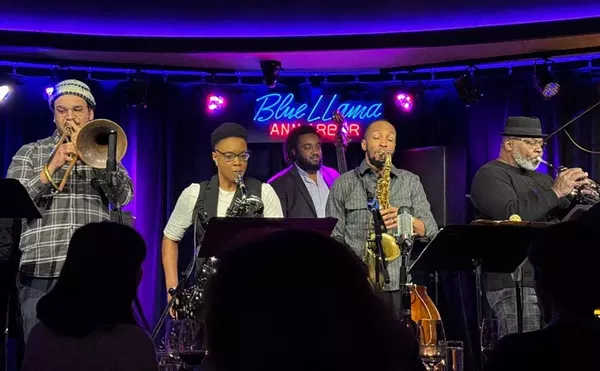“Oh, my God, I can’t believe you play like that! You’re so good for a girl! I’m not trying to disrespect you or anything, but I’ve never seen a girl play like that!” mocks the Donnas’ drummer, Donna C., in her best imitation of the countless dumb-shit, dimwit boys who have crossed her band’s path. “Guys still come up to our faces and say that! We’re used to it, though.”
If society were truly as liberated as it pretends, such experiences would seem as unfathomably outdated as the true stories about when single women couldn’t get credit cards or vote. Instead, it’s not surprising that the Donnas — like many other female musicians — inspire such rabid rock territorialism in the boys next door. After all, by flip-flopping the traditional gender notions of so-called “cock rock,” these four Bay Area women have turned their oft-considered masculinized and misogynist genre of music into a Third Wave feminist free-for-all where boy rockers are anything but as macho and in control as they believe.
On the surface, the Donnas aren’t anywhere as overtly political as, say, Le Tigre or Sleater-Kinney. For listeners who aren’t so nearsighted that they can’t appreciate the still-revolutionary existence of an all-female band, however, the Donnas offer up more than their fair share of progressive — albeit less prominent — politics. Not only are they fucking with conventional notions of genre and gender by staking claim to music that’s traditionally considered male territory (see: AC/DC, KISS), Donnas C., A., R. and F. are blatantly turning the tables on men lyrically as well.
Throughout their latest album, Turn 21, they don’t give guys the time of day, blowing off boys like they’re going out of punk-rock style. It’s the first single, though, that truly illustrates how subversive the Donnas’ pop metal is: “I got boys all over the road/I got boys helping me unload” goes “40 Boys in 40 Nights,” hilariously turning the historically feminized figure of the groupie into a beck-and-call rock boy who not only offers dick on demand but lugs around gear too. “It’s really unfair, though,” explains Donna C., “because guy bands have hot girl groupies after them. But we have 40-year-old men!”
Even when the Donnas take on an overtly sexual stance (“Do You Wanna Hit It?” asks one song), their come-hithers feel less like come-ons than do-or-die dares sung with all the inflated strut and swagger of Jagger. So while many straight guys may salivate over the band’s pro-sex and pro-rock sensibilities, the Donnas ain’t exactly what many hard-rock fans have come to expect: These women don’t put out or rock out unless it’s on their own terms.
It’s not surprising, then, that the (largely male) backlash against the Donnas was so swift and strong. Since the foursome formed at age 13, eight years ago, the laundry list of scenester whispers and unfounded accusations has grown dramatically: The band was created and controlled by a Svengali; they don’t play their instruments; they don’t write their songs; they’re a novelty act. Things got so nitpicky at times that they were dismissed as too contrived for all “sharing” the same first name. (As if anyone cared when all the men in the Ramones used the same last name).
All of which amounts to the sad fact that many people still see women rockers as precocious wannabes best left to lip-synching in their pink frilly bedrooms. Because if the Donnas were considered anything but a joke, then untold numbers of men would have to question how gender plays into conventional notions of authenticity, that holiest grail of rock ’n’ roll. So it’s easiest to simply exclude women and prohibit them from entering the rock canon.
“In high school, guys made fun of us a lot for being in a band,” says Donna C. “It was the ‘cool thing’ for boys our age to be in bands, and they’d tell us, ‘Go home and play with your dolls.’”
Due to such persistently sexist responses, women often feel the need to prove their technical abilities to dispel stereotypes about women in rock.
“We have to work really hard to try and stop and overcome stereotypes,” says Gel of the all-women, pop-punk trio the Eyeliners, who open for the Donnas at the Majestic Theatre on Tuesday. “Like, I’ll play guitar behind my hip and that sorta thing. We don’t like the ‘You’re good for a girl band’ thing, so we really try to show our musicianship.”
Of course, even though it’s almost always associated with men, rock music culture doesn’t revolve around them, and women in rock don’t exist in response to men. So while many insecure boys get territorial and defensive when all-female rock bands take the stage, it’s the women who — most importantly — are often most receptive.
“Seeing girl bands is an inspiration for young girls,” Gel says excitedly. “A lot of them come up and say, ‘I want to start a band!’”
Jimmy Draper writes about genres and genders for Metro Times. E-mail him at [email protected]





